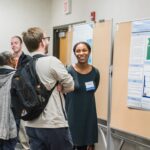
UMBC’s 40th Graduate Research Conference, hosted by the Graduate Student Association on March 28, 2018, will give master’s and Ph.D. students a chance to share their work, receive constructive criticism on their communication skills, and connect with researchers from all corners of the university. This year’s conference will also include talks from Carole McCann, professor and chair of gender and women’s studies, and Taka Yamashita, professor of sociology and gerontology, on the importance of interdisciplinary collaboration, as well as a special presentation by the Alan Alda Center for Communicating Science.
“A major part of the experience as a grad student is to create new knowledge or new modes of creative expression, and to write the best possible thesis or dissertation,” says Jeffrey Halverson, associate dean of UMBC’s Graduate School. As a complement to the research itself, he explains, “the Graduate School also wants to emphasize practicing and honing one’s ‘soft skills’—that is, communicating your results, finding interdisciplinary crossroads to explore, and taking advantage of professional development opportunities.”
Students will present more than 50 posters and give 20 short talks. Four panels—focused on health, machines, global issues, and communities—will allow graduate researchers to share their work in an interdisciplinary context. All students who present posters or give talks receive feedback from faculty judges on their presentation strengths and how they might more effectively share their work with different audiences in the future.
Lipi Mukherjee, a fifth-year Ph.D. student in atmospheric physics, is participating in the GRC for the second time. The first time, she benefited from both presenting a poster and observing other students’ talks. “It showed me what a good talk looks like, and how you can take advantage of a platform like GRC,” she shares. Her advice? “Take it seriously. It can be your first step in developing your presentation skills, and it is a very unintimidating environment.”
Juan Valdez ‘12, biological sciences, M.S. ‘13, applied molecular biology, a fifth-year Ph.D. student in biological sciences, and a prior GRC participant, agrees. “Any sort of practice in presentation is super valuable,” he says. UMBC’s applied molecular biology master’s program and Bridge to the Doctorate program both required Valdez to present, and he’s glad they did. He says it was scary at first, but he’s seen huge improvements in his presentation skills based on honest feedback from the judges. To uncertain grad students considering presenting, he says, “Just do it.”
Graduate students who are close to completing their degrees may also participate in the Three Minute Thesis (3MT) competition. In the 3MT contest, which began at the University of Queensland in 2008 and now is held at over 200 universities worldwide, graduate students are challenged to present a three-minute talk encapsulating their entire dissertation. The winners continue on to a national competition.
“I think my research is really cool, but sometimes I struggle with trying to explain to people what I do,” says Alex Rittle, a third-year Ph.D. student in geography and environmental systems and a member of the GRC planning committee. “3MT is basically practicing your elevator speech. How do you distill everything you’re doing—which is going to be hundreds of pages of a dissertation—into three minutes? It helps me think about the essence of what I’m doing.”
This year, 3MT participants have had the opportunity to prepare for their talks one-on-one with Scott Morgan, a communication skills expert. After reading Morgan’s book, Mustafa Al-Adhami, M.S. ‘15 and a second-year Ph.D. student in mechanical engineering, was excited for the opportunity to work with him and hone his 3MT presentation. Al-Adhami, who is a budding entrepreneur, notes that “this is how it works in real life—you don’t get much time to present your idea, so I thought the 3MT would be good practice for the future.”
Last year’s 3MT winner, Denise Williams, a third-year Ph.D. student in chemistry, emphasizes that beyond the value of presenting her own work, she’s particularly enjoyed the opportunity to connect with graduate students working in vastly different fields, whom she wouldn’t just run into in the lab or the classroom.
Morgan Bunting, a gerontology Ph.D. student and member of the GRC planning committee, agrees. “GRC gives graduate students training on how to ace professional conferences in the field, and by participating, students practice how to communicate their research in an accessible way,” she says. “It’s also just a wonderful way to engage the community and learn what amazing work is going on in the Graduate School.”
Learn more about this year’s program on the research conference website.
Image: Ashley Wayne Thomas, a Ph.D. student in mechanical engineering, discusses her research with a fellow student at GRC 2017. Photo by Marlayna Demond ’11 for UMBC.





